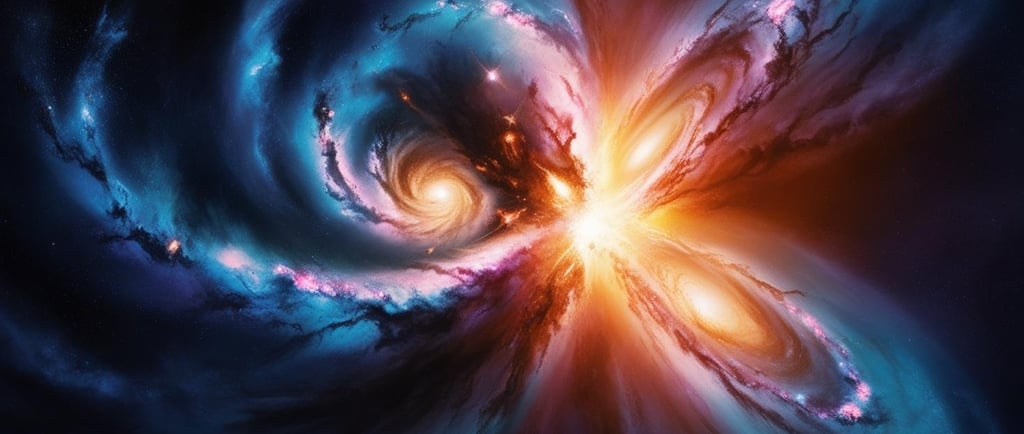The Mind's Eye
Why Human Imagination Drives Our Existence


In the quiet corners of our minds, entire universes unfold. A child transforms a cardboard box into a spaceship. A scientist envisions the dance of atoms no human eye has seen. An entrepreneur pictures a technology that doesn't yet exist. This remarkable ability—imagination—defines humanity as much as any physical trait. But why do we imagine? What evolutionary purpose does this seemingly magical capacity serve?
Survival Through Simulation
Our ancestors who could imagine a lion hiding in the tall grass—without needing to see it first—lived to pass on their genes. Those who could envision where water might be found during drought survived when others perished. Imagination evolved as nature's ultimate survival tool.
Cognitive scientists describe imagination as our brain's simulation software—allowing us to test scenarios mentally before risking them physically. This predictive capacity gave early humans unprecedented advantages over other species confined to learning solely through direct experience.
"Imagination is a form of time travel," notes neuroscientist Dr. Adam Zeman. "It lets us visit potential futures, explore hypothetical pasts, and experience alternative presents without moving an inch."
The Social Advantage
Beyond physical survival, imagination enables our extraordinary social capabilities. Our ability to imagine what others might be thinking—what psychologists call "theory of mind"—forms the foundation of empathy, cooperation, and complex social structures.
Through imagination, we can momentarily inhabit another's perspective, anticipate their needs and reactions, and adjust our behavior accordingly. This social imagination allowed humans to coordinate in larger groups than any other primate, creating the foundation for civilization itself.
Anthropologist Maurice Bloch suggests that imagination allowed early humans to conceive of abstract entities like "the tribe" or "the ancestors," enabling organization beyond immediate family groups. The capacity to imagine institutions, roles, and rules that exist only in our collective minds made civilization possible.
Beyond the Practical: Meaning and Transcendence
Perhaps most profoundly, imagination responds to our uniquely human awareness of mortality and our hunger for meaning. Through imagination, we create frameworks that help us understand our place in an often incomprehensible universe.
Ancient humans looked at the night sky and imagined constellations, stories, and cosmic orders that made the mysterious heavens comprehensible. These weren't merely entertainments but essential tools for making sense of existence itself.
Philosopher Mark Johnson argues that imagination is fundamental to finding meaning: "Without imagination, we could never make sense of our experience. We would be unable to see beyond the present moment, unable to draw connections between events, and unable to grasp our experiences as coherent."
The Engine of Innovation
Every human advancement begins as an act of imagination. Before the wheel existed, someone had to envision it. Before we reached the moon, writers and dreamers had to imagine the journey. Einstein's theory of relativity began not with an experiment but with a thought experiment—imagining himself riding alongside a beam of light.
In our increasingly complex world, imagination may be our most critical resource for addressing unprecedented challenges. Climate change, global pandemics, social division—these problems require us to envision solutions and futures that don't yet exist.
The Joy of Possibility
Beyond its practical applications, imagination brings us profound pleasure. When we lose ourselves in a novel, daydream about possibilities, or create artwork, we experience what psychologist Mihaly Csikszentmihalyi called "flow"—a deeply satisfying state of complete immersion.
This intrinsic joy suggests imagination serves purposes beyond mere survival or problem-solving. It enriches our subjective experience, expanding our lives beyond the constraints of immediate physical reality.
Our Defining Trait
In a world of increasing automation, imagination remains uniquely human. While artificial intelligence can analyze, optimize, and even create based on existing patterns, the generative, boundary-breaking leaps of human imagination remain distinctly our own.
We imagine because it's who we are—creatures who can see beyond what is to what could be. This capacity has taken us from caves to cities, from simple tools to spacecraft, from isolated tribes to global civilization.
Our imagination is not separate from our reality—it creates our reality. Every human-made object around you began as an act of imagination. The societies we live in, the technologies we use, the art that moves us, all emerged first in the mind's eye of a human who dared to imagine something new.
In the end, we imagine not just because it helps us survive, but because it helps us live—with purpose, with meaning, and with the endless possibility that tomorrow could be different from today.
How does imagination shape your life? Share your thoughts in the comments below.
